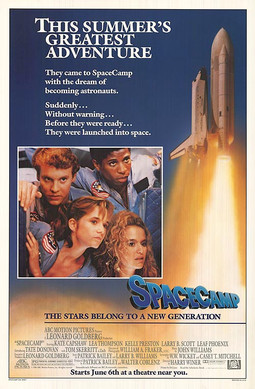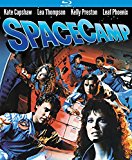| Reviews & Columns |
|
Reviews DVD TV on DVD Blu-ray 4K UHD International DVDs In Theaters Reviews by Studio Video Games Features Collector Series DVDs Easter Egg Database Interviews DVD Talk Radio Feature Articles Columns Anime Talk DVD Savant Horror DVDs The M.O.D. Squad Art House HD Talk Silent DVD
|
DVD Talk Forum |
|
|
| Resources |
|
DVD Price Search Customer Service #'s RCE Info Links |
|
Columns
|
|
|
SpaceCamp
Producer #1: "How's this for an idea? Teenagers in outer space! We could send them up aboard the Space Shuttle, so we could market it as a disaster movie, too!"
Producer #2: "Yeah, that's the ticket! Something like Star Wars, with lots of special effects and maybe a cute robot, but coupled with teen angst and romance for the 14-26 year-old demographic!"
Producer #1: "Here's something else it needs: a summer camp setting. I've got it - space camp!"
The resultant film has good and bad points, mostly in the latter category, including cringe-worthy moments of melodrama, some terrible (even by 1986 standards) special effects, and a plot point so ludicrously unbelievable suspension of disbelief becomes impossible. From a box-office standpoint, SpaceCamp was a non-starter when, shortly before it was to open, the Space Shuttle Challenger exploded shortly after takeoff on January 28, 1986, casting a great pall over what had been intended as lighthearted entertainment.
The movie opens well, with a young Andie Bergstrom watching John Glenn's Friendship 7 mission fly across the night sky, solidifying her determination to one day reach for the stars herself. (The scene was cleverly staged on a soundstage set, with forced perspective. It's lovely and, unfortunately, visually at odds with the rest of the movie.)
In the present, the now adult Andie (Kate Capshaw) is a trained NASA astronaut and shuttle pilot, though passed over on shuttle missions so far. She and her astronaut husband, Zach (Tom Skerritt), who made it to the Moon, agree to work as instructors at Space Camp, the NASA affiliated program training children and teenagers aspiring to join America's Space Program.
Five kids join Andie's team: Kathryn (Lea Thompson), a dedicated older teenager with the Right Stuff, who idolizes Andie but can't understand Andie's constant criticism and impatience toward her; Kevin (Tate Donovan), a rich kid with no interest in the program; Rudy (Larry B. Scott), token black kid, who loves science but lacks confidence; Tish (Kelly Preston), requisite Valley Girl/airhead-type, who actually is highly intelligent with a photographic memory; and Max (Joaquin Phoenix, then billed as "Leaf Phoenix"), a precocious 11-year-old obsessed with Star Wars.
Lonely Max befriends Jinx (voiced by Frank Welker), an impossibly sentient robot technologically impossible in 2017, let alone 1986. Despite this, NASA seems disinterested in the fantastical robot, allowing Max to keep it in his closet, a virtual pet. The robot and the kid become pals, and when Jinx learns of Max's dream to travel in outer space, Jinx dutifully facilitates it, hacking NASA's main computer system and sabotaging an Atlantis engine test, triggering a "thermal curtain failure" while Andie and the kids are, improbably, are allowed onboard all by their lonesome.
The thermal curtain failure ignites one of the rocket boosters, forcing a launch to avoid a catastrophic explosion. Not flight-ready, the Shuttle has a limited oxygen supply and the radio, inexplicably, is out of order, leaving the kids and their teacher more or less on their own, lost in space. On this point, even the Saturday morning kids show Far Out Space Nuts is more dramatically acceptable ("I said ‘lunch' not ‘launch!'").
SpaceCamp was the last production of ABC Motion Pictures, the TV network's second stab at a theatrical division, this one lasting from 1979-1985. Many of the behind-the-scenes people involved came from TV, which might account for the movie's off-kilter feel. The art direction is often cheap-looking and ugly, particularly the mission control center set used during the crisis; it looks like something made for a Glen Larson-produced TV-movie.
Despite the many Star Wars references and John Williams musical score (which never actually uses any Star Wars cues, even where you'd think they'd might be called for), SpaceCamp's producers didn't enlisted George Lucas's Industrial Light & Magic for the film's special visual effects. Even by mid-1980s standards, SpaceCamp's SPFX are surprising bad, ranging from competent-but-unimaginative to downright shoddy. In many scenes compositing live actors with special effects, traveling mattes "bleed" into areas of the screen not intended: shadows, panels, etc.
According to actress Thompson, initially not much thought went into the problem of depicting the weightlessness of space, particularly within the Shuttle's cramped quarters. For most of these scenes, the actors simply tried to move and position themselves as if they were weightless. Thompson, with her background as a professional ballerina, had no problem with this, but the other actors struggle and the ruse doesn't work.
In one scene, for instance, Tate Donovan is awkwardly positioned up against a wall, trying to appear weightless, but a trembling ankle, obviously cramping from bearing the entirety of his weight, gives the trick away.
SpaceCamp is on dramatically shaking ground in other ways, too. You'd think Max's obsession with Star Wars would resonate with many in the audience, but his near-delusional obsession seems very phony. One scene in particular, with Kevin browbeating poor Max into a crying jag, is cringe-worthy.
Somewhat better is the film's attempts to convey the wonders of NASA's space program, with on Blu-ray the footage of real Space Shuttles used to good advantage. Uniquely adorable Lea Thompson is well cast for this sort of thing, projecting determination and sincere longing quite well. Tate Donovan, like Phoenix nearly unrecognizable as the fine actor he'd later become, is trapped in a contrived part, but glimmers of natural ability shine through.
Partly the movie came too late. Clint Eastwood's Space Cowboys (2000) isn't much more believable, but that entertaining film was wise to make its protagonists former test pilots who get a late-in-life chance to finally get into orbit. The nation had been agog with the Space Program and the Mercury, Gemini, and early Apollo astronauts, so it's surprising there weren't really any movies quite like this during the 1960s beyond trifles like The Reluctant Astronaut (1967). Interest in the Space Program went way down by the last Apollo missions, though rekindled modestly with Skylab and the early days of Space Shuttle program.
The Challenger accident, the mourning and scandal that followed as well as the long delay between the tragedy and the next mission, almost three years, gave SpaceCamp an unanticipated air of bad taste. Trivial escapism was now marred by current events and a story that put kids in peril, aboard a shuttle whose launch is triggered by an accident eerily similar to what blew up the Challenger. Audiences stayed away.
Video & Audio
SpaceCamp is presented in 1.78:1 widescreen, approximating its 1.85:1 OAR. The image is good, with the shaky effects unrelated to the fine video transfer, while the DTS-HD Master Audio 2.0 surround reflective of the original Dolby Stereo release version. Optional English subtitles are included on this Region A disc.
Extra Features
Supplements include two new video interviews, each enlightening, with Lea Thompson and director Harry Winer. A theatrical trailer is also included.
Parting Thoughts
Not good but harmless as entertainment, for family viewing SpaceCamp is very mildly Recommended.
Stuart Galbraith IV is the Kyoto-based film historian largely absent from reviewing these days while he restores a 200-year-old Japanese farmhouse.
|
| Popular Reviews |
| Sponsored Links |
|
|
| Sponsored Links |
|
|
| Release List | Reviews | Shop | Newsletter | Forum | DVD Giveaways | Blu-Ray | Advertise |
|
Copyright 2024 DVDTalk.com All Rights Reserved. Legal Info, Privacy Policy, Terms of Use,
Manage Preferences,
Your Privacy Choices | |||||||
















